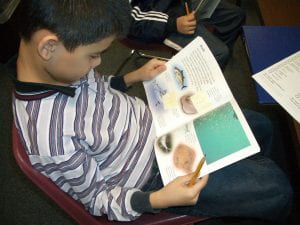Longitudinal projects funded by 
 CLIMB
CLIMB
Capturing Language IMmersion Benefits
[NCER: 07/01/2019 – 06/30/2023;12/31/2025; R305A190452]
Becoming bilingual does not only mean learning to speak and read a second language. Learning more than one language entails the development of social, cultural, cognitive, and even emotional skills that are the result of our brains and minds expanding in new and novel directions afforded by the experience of more than one language. In Project CLIMB (Capturing Language IMmersion Benefits) we seek to explore the impact of the bilingual experience in Spanish immersion school settings on children’s cognitive, socio-cognitive, and reading outcomes in English and Spanish. Funded by the Institute of Education Sciences (IES), this three-year longitudinal study will focus on Grades K to 5 and center on executive function skills, language, and specific reading comprehension components (e.g., inferencing) that impact reading comprehension. Additionally. given that research has consistently found that motivation and engagement relate to reading comprehension both directly and indirectly, we will also explore these constructs closely in relation to the comprehension of Spanish and English texts.
The focus on EF skills is important because the literature on bilingualism has found, overwhelmingly, that bilinguals (adults and children) have more developed and stronger EF skills than monolinguals. Language-immersion school settings present a unique scenario to observe and understand the mechanisms and impact of bilingualism on these skills, and their impact on literacy achievement – across languages. In addition, limited work has documented the nature of effective, high-quality Spanish-immersion instruction. Thus, an equally important goal of Project CLIMB is to document the essential features of effective immersion instruction through consistent observations in Grades K to 5.
Project LEARN is a partnership between the University of Maryland, College Park (UMD) and Anne Arundel County Public Schools (AACPS). This longitudinal study seeks to explore the skills that contribute to students’ reading comprehension achievement and how these skills may differ for English Learners (ELs) and English Monolingual students (EMs). Funded by the Institute of Education Sciences (IES), the goal of Project LEARN is to study whether ELs’ reading comprehension is rooted in standard language-related skills like vocabulary and inference-making, or other factors such as motivation and executive function (EF) skills, to determine effective targets for intervention for students in Grades 1 to 4. In order to study the relationships among language, EF skills, reading motivation, and reading comprehension a series of assessments are administered to approximately 900 students in the fall and spring each academic year for three years.
 USHER
USHER
United States History for Engaged Reading
[NCER: 7/1/2010-6/30/2014; R305A120814//R305A100297]
Working with language arts and social studies middle school teachers (grades 6 and 7) we developed the United States History for Engaged Reading (USHER) curriculum (2010-2015). USHER focused on a set of cognitive and motivation principles with the goal of fostering reading engagement by emphasizing reading comprehension, reading motivation, and academic vocabulary in English Monolingual students and English Learners. Funded by the Institute of Education Sciences (IES), this study was theoretically grounded in the reading engagement model (Guthrie & Wigfield, 2000), but aimed to alleviate the void left by scant research on adolescent literacy in the content area of social studies and the curricular adaptations needed for ELs. Many of our lessons learned from teachers and students and USHER principles and practices can be found in Dr. Taboada Barber’s book entitled Reading to Learn for ELs (Heinemann).


